Preface
Apple (NASDAQ:AAPL) CEO Tim Cook, finally, went on the record with Bloomberg and divulged that the tech giant is in fact working on self-driving car technology. Further, we believe Apple will take an active stance in all three markets Cook addressed: self-driving software, electric vehicle manufacturing, and ride-sharing. That makes for a several trillion-dollar total addressable market (TAM) according to Morgan Stanley.
This is a long read so we'll motivate it ever further by taking a step back in history to start, remembering that none other than Tesla Inc. (NASDAQ:TSLA) CEO Elon Musk said on January 11th, 2016 that Apple's foray into the car market was "an open secret."
Musk went further to say that "Apple will probably make a compelling electric car."
Story
The Apple car story began with the secretive process developed under the name "Project Titan," and while Apple had not officially announced it, there was enough circumstantial evidence to trust the leaks that a car was in the works.
Of course, CML Pro members knew that a couple of years ago, Apple was in fact not just getting into the technology behind self-driving cars from the software side, but also from the actual automobile manufacturing side due to contact we had with a former Apple executive that confirmed the 'car.'
But we are not 'a couple of years ago' anymore, we are today, and there is still a lack of clarity as to what Apple is doing in the space. Let's review what Tim Cook said, and then we'll talk about the total addressable market and the possibilities for Apple with respect to products.
Tim Cook Says
Apple CEO Tim Cook noted that the revolution coming in the automobile space is an unusual coincidence of three separate trends: (1) electric vehicles, (2) self-driving technology and (3) ride-sharing.
Further, Cook said out loud that Apple was actively working on an artificial intelligence-centric project. That's what we know. Let's start with the total addressable markets (TAM).
Electric Vehicles (EV)
The size of the global market for electric vehicles in 2019 is projected to reach $272 billion. Here is a nice chart comparing 2012 to 2019 from our friends at Statista.
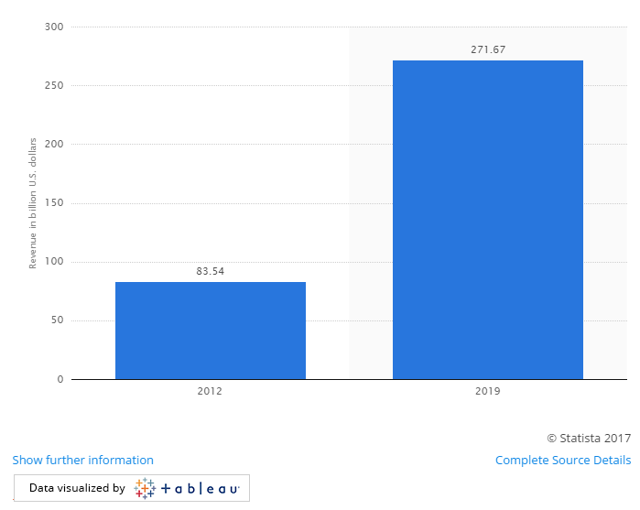
That represents a 19% compounded annual growth rate through 2019, starting in 2012. But, the real measure comes from the tiny share that the EV market claims:
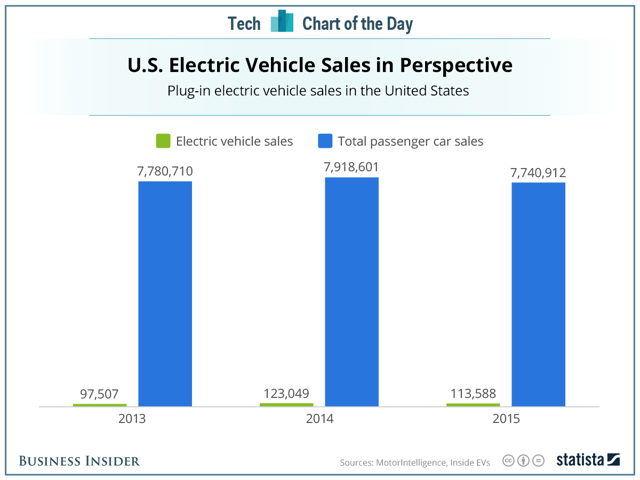
A part of this growth has been spurred by falling battery costs:
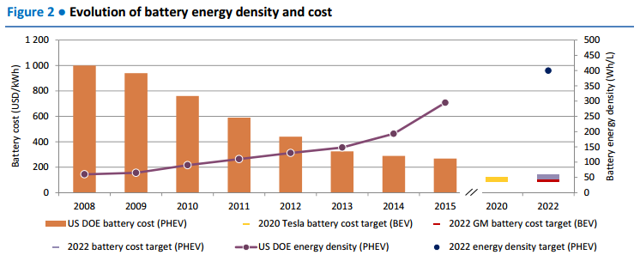
Source: International Energy Agency (IEA)
But that's just cars - it goes much further. We get this from the Global EV Outlook 2016 produced by the International Energy Agency (IEA).
The electrification of road transport modes other than cars, namely 2-wheelers, buses and freight delivery vehicles, is currently ongoing in a few localized areas.
With an estimated stock exceeding 200 million units, China is the global leader in the electric 2-wheelers market and almost the only relevant player globally, primarily because of the restriction on the use of conventional 2-wheelers in several cities to reduce local pollution.
China is also leading the global deployment of electric bus fleets, with more than 170 000 buses already circulating today.
Various scenarios of growth were also presented by the IEA:
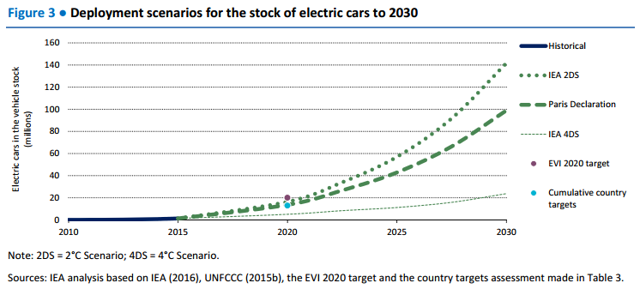
Source: International Energy Agency (IEA)
The Point: The EV market is going to grow rapidly, and it might grow faster than 'rapidly.'
We note this before we move forward because Apple, unlike any of the other tech giants, actually "makes things" at a mass scale. Alphabet (NASDAQ:GOOG) (NASDAQ:GOOGL), Amazon (NASDAQ:AMZN) and Facebook (NASDAQ:FB) do not.
Self-driving Featured Cars
We share this image regularly, and we will do so again for completeness:
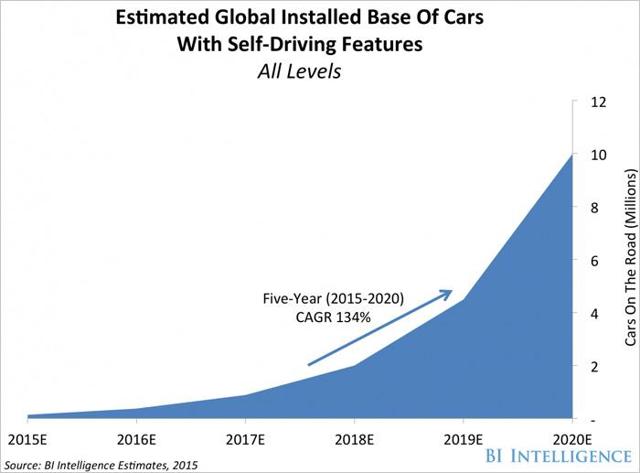
That's 134% compounded annual growth for the next five years in the self-driving featured car space. If that 10 million vehicle number is hot by 2020, and we assume a $30,000 average price, that alone would be $300 billion as a TAM.
We will step into Apple's move below. Finally, we move to ride sharing.
Ride-Sharing
The ride-sharing market is currently dominated by Uber (Private:UBER) in the United States, where it has about 85% market share. In larger cities where Uber and Lyft (Private:LYFT) compete, estimates have Uber at 75%-80% of the market. Here is the forecasted growth for all ride-sharing in selected countries:
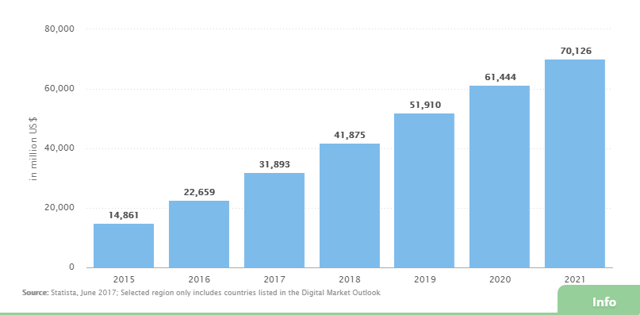
Source: Statista
That's a $32 billion market growing to over $70 billion. But the real addressable market here for Apple is not just about dollars, but rather penetration.
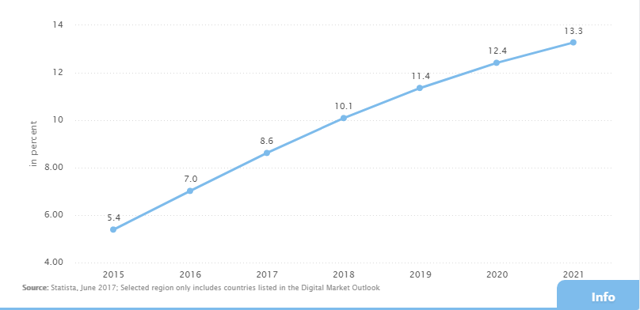
Source: Statista
Within five years, we could be looking at a world where more than 1 in 8 people uses a ride-sharing service. Even further, the average revenue per user (ARPU) is growing:
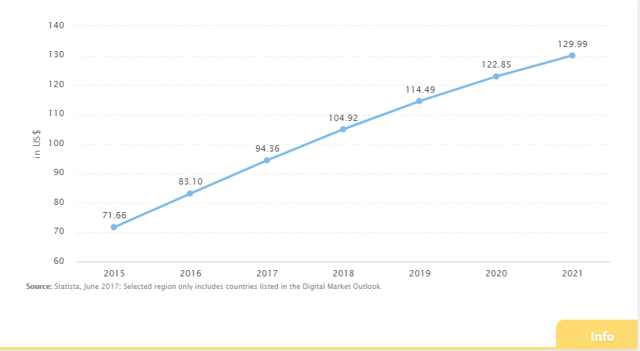
Source: Statista
Total Addressable Market (TAM)
The total addressable market, or really, markets, get into the trillions of dollars here, so if you're looking for a place for Apple to grow, these are it. As an aside, Apple is also delving deep into Healthcare Technology and Augmented Reality.
Apple
We can see that Tim Cook is, of course, quite accurate in naming three distinct yet concurrent disruptions coming to the world of driving. The question surrounds which of the three Apple will pursue, and how.
We do note some rather obvious moves by the company of late.
On November 22nd, Apple wrote a letter to the National Highway Traffic Safety Administration (NHTSA). Here are some snippets before we dive deep (emphasis added):
Apple uses machine learning to make its products and services smarter, more intuitive, and more personal. The company is investing heavily in the study of machine learning and automation, and is excited about the potential of automated systems in many areas, including transportation.
Executed properly under NHTSA's guidance, automated vehicles have the potential to greatly enhance the human experience-to prevent millions of car crashes and thousands of fatalities each year and to give mobility to those without.
It is vital that those developing and deploying automated vehicles follow rigorous safety principles in design and production. Such principles should not, however, inhibit companies from making consequential progress; there is no need to compromise safety or innovation.
Apple affirms that, in order to best protect the traveling public and keep up with the pace of innovation, NHTSA should expedite requests for exemption and interpretation and petitions for rulemaking.
And, Apple went further:
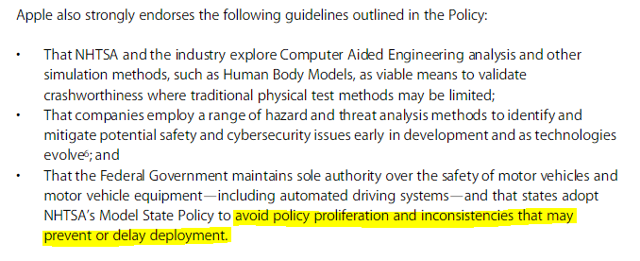
But we can just look back two months to see this news: Apple Gets Permit to Test Self-Driving Cars in California:
SAN FRANCISCO - Apple plans to start testing self-driving cars on California roads, the clearest signal yet that the world's most valuable technology company wants to design or build autonomous vehicle technology.
On Friday, the California Department of Motor Vehicles granted Apple an official test permit that the agency said would allow the company to test autonomous driving technology in three 2015 Lexus RX 450h luxury hybrid sport utility vehicles. The permit authorizes six people to take control of the vehicles if necessary.
Software
Since Apple already has its CarPlay product, we feel comfortable with the idea that Apple will in fact build a self-driving software platform. For the record, here is how Apple describes CarPlay as of today:
CarPlay features Siri voice control and is specially designed for driving scenarios. CarPlay also works with your car's controls - knobs, buttons, touchpad, or touchscreen.
And the apps themselves have been reimagined for the car, so you can use them while your eyes and hands stay where they belong.
The main players in this space, without an actual car, are Alphabet's Waymo, Nvidia (NASDAQ:NVDA) and everyone else, the Intel (NASDAQ:INTC)-Mobileye combination (maybe) and if we include actual vehicle makers, then we must include Tesla.
A Physical Car
Now, the real question becomes if Apple will build a car, and we feel rather strongly, though we are out on a limb, that it will. This may be an in-house project, but more likely, it will be a combined effort with an established auto-maker.
We do have a leak from an insider that at one point Apple was building a car on its own - or at least had its sights set on that endeavor. Whether that has changed over the last two years or not is up for debate.
But, the idea of teaming up with a manufacturer makes a lot of sense. Rumors swirled around BMW (OTCPK:BMWYY) for the longest time, but it appears those talks have cooled. In either case, naming which manufacturer isn't the issue, it's if there will be one. Our guess is yes, which means Apple would have both an entire self-driving car platform, and a co-branded Apple Car. Said differently, Apple would challenge everyone, from Tesla and Mercedes (OTCPK:DDAIY) to Alphabet, and Intel-Mobileye.
The main players in the actual manufacturing of self-driving and electric cars are Tesla, and soon to follow dozens of large scale auto manufacturers, especially Mercedes-Benz, Honda (NYSE:HMC) together with Alphabet, and General Motors (NYSE:GM) together with Lyft.
Ride-Sharing
This is where we feel like the opportunity is wildly misunderstood. We believe whole-heartedly that Apple will be getting into the ride-sharing world and that's exactly why Tim Cook noted it in his interview with Bloomberg.
Remember, Apple made a one billion investment in Didi, which is 'China's Uber' (but bigger).
Even further, and widely under reported, in a patent application we found submitted to the United States Patent and Trademark office (USPTO) surrounding, of all things, social media, Apple quietly, but obviously, put in a reference to ride-sharing through a new social network driven by iPhone owners.
In our dossier "The Secret's Out: Apple is Creating a Social Network," we noted this rendering:
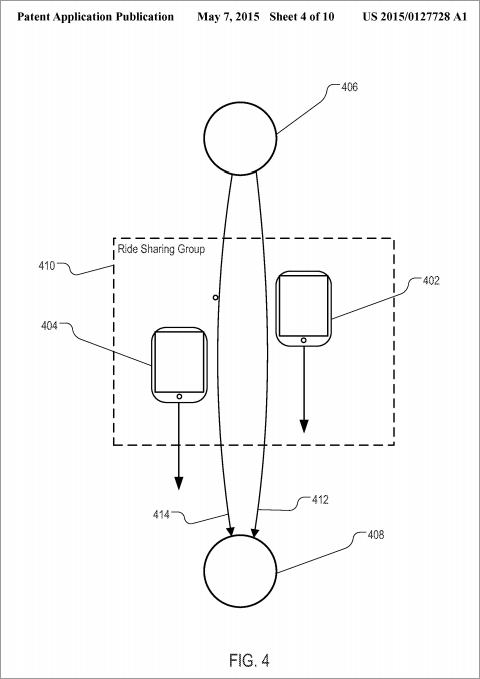
Yes. Apple is not only automatically forming social networks, and not only tracking where people eat and shop, but is targeting ride-sharing as well.
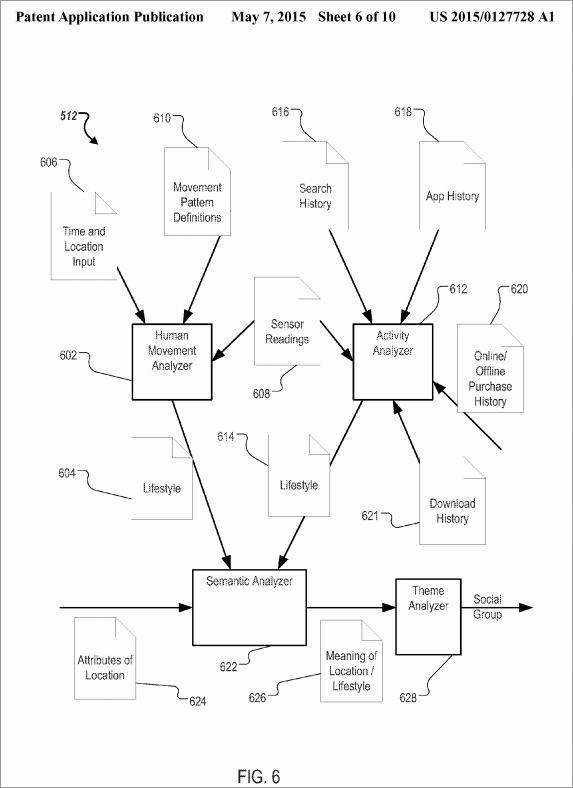
Apple may be patenting the ability to integrate not only your location, but your purchases, your downloads, your words, indeed, all of your "sensor readings" into an omnibus algorithm to understand all things about the way their users interact and that clearly includes ride-sharing.
The main players in the ride-sharing world are Uber in the United States, together with Lyft, and in China it's Didi.
Conclusion
Tim Cook let the "open secret" out to Bloomberg and went further to name three distinct areas of disruption. We have no reason to believe that Apple will not compete in all three, and we have further evidence from patent filings, prior investments and current products that lend to support our conclusion.
The risks are aplenty in a new market and the competition will be fierce. But, when it comes down to it, there is no company in the world, as of right now, that makes high end consumer electronics at the scale of Apple, nor is there a company with more financial resources at its disposal.
We maintain our Top Pick on Apple Inc., even though we see the potential for substantial market volatility in the short term.
WHY THIS MATTERS
It's really understanding technology that gets us an edge, and then finding the gems that can turn into the 'next Apple,' or 'next Amazon,' where we have to get ahead of the curve. This is what CML Pro does.
Each company in our 'Top Picks' has been selected as a future crown jewel of technology. Market correction or not, recession or not, the growth in these areas is a near certainty.
The precious few thematic top picks for 2017, research dossiers, and alerts are available for a limited time at an 80% discount for $19/mo. Join Us: Discover the undiscovered companies that will power technology's future.
Thanks for reading, friends.
The author is long shares of Apple Inc. at the time of this writing.
Legal
The information contained on this site is provided for general informational purposes, as a convenience to the readers. The materials are not a substitute for obtaining professional advice from a qualified person, firm or corporation. Consult the appropriate professional advisor for more complete and current information. Capital Market Laboratories ("The Company") does not engage in rendering any legal or professional services by placing these general informational materials on this website.
The Company specifically disclaims any liability, whether based in contract, tort, strict liability or otherwise, for any direct, indirect, incidental, consequential, or special damages arising out of or in any way connected with access to or use of the site, even if we have been advised of the possibility of such damages, including liability in connection with mistakes or omissions in, or delays in transmission of, information to or from the user, interruptions in telecommunications connections to the site or viruses.
The Company make no representations or warranties about the accuracy or completeness of the information contained on this website. Any links provided to other server sites are offered as a matter of convenience and in no way are meant to imply that The Company endorses, sponsors, promotes or is affiliated with the owners of or participants in those sites, or endorse any information contained on those sites, unless expressly stated.